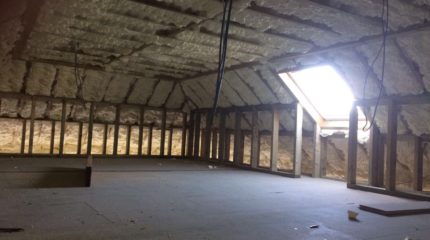Spray Foam Insulation vs Cellulose
About IcyneneWhen it comes to home insulation in the UK, we understand that you want to ensure you are getting the best quality insulation so you can reap the most benefits. Efficient and successful insulation can save you money on your energy bills, reduce air and noise pollution and protect your home from moisture, mould and drafts. Read our guide and learn the difference between cellulose and spray foam insulation and discover the type of insulation that is right for you.
What is cellulose insulation?
Cellulose insulation is made up recycled newspaper, and usually used as an environmentally friendly way of protecting your home from noise and draft. Cellulose offers a safe and sustainable insulation solution that can even provide a form of pest control to keep bugs and insects out of your home. It is treated with acid prior to application which increases its fire resistance.
Where other types of insulation hold moisture on the surface, cellulose absorbs moisture with ease meaning it poses the risk of forming mould which effectively decreases its lifespan. The loose-fill insulation provides a good performance value with air tightness levels increasing by up to 30%. Unlike spray foam insulation, however, its application of the loose pieces of fibre can be rather tricky and may not fill crevices and small holes.
What is Icynene spray foam insulation?
Icynene spray foam is useful for long-term insulation. When sprayed, the foam expands to form a solid air-tight layer to reduce condensation and increase heat retention. Icynene spray foam offers better insulation than other types of insulation like cellulose, as its spray form allows foam to reach smaller crevices for a more efficient and easily applied protective layer to your building. Spray foam insulation also has the advantage of preventing mould from forming and improving the air quality in your building so you can save up to 50% on energy bills.
Why should I choose spray foam insulation?
Investing in spray foam insulation can reduce energy bills and increase the value of your home. Its heat retention properties mean you may be able to reduce the size of your heating or cooling systems in your house, saving money on installation and maintenance costs. With no harmful gases emitted during the application process, Icynene foam spray insulation is a safe and sustainable solution to residential and commercial insulation.
Icynene spray foam is available in two forms to match your specific needs. Icynene open cell spray foam lets buildings breathe naturally and improves thermal conductivity. Alternatively, Icynene closed cell spray foam has a more rigid structure for improved energy efficiency and structural integrity. Although cellulose insulation may be useful for short term applications, Icynene insulation is an effective investment in the long term, reducing costs with an increased reliability.
For more information on spray foam, check out our full guide on spray foam insulation.
Make a worthwhile investment to your commercial or residential building with Icynene spray foam and increase the value of your property. For residential insulation services speak to one of our specialists today! Call Mass Foam Systems on 0800 246 5051 to find out more about spray foam insulation or to receive a free quote for your project.
Back to blogs



